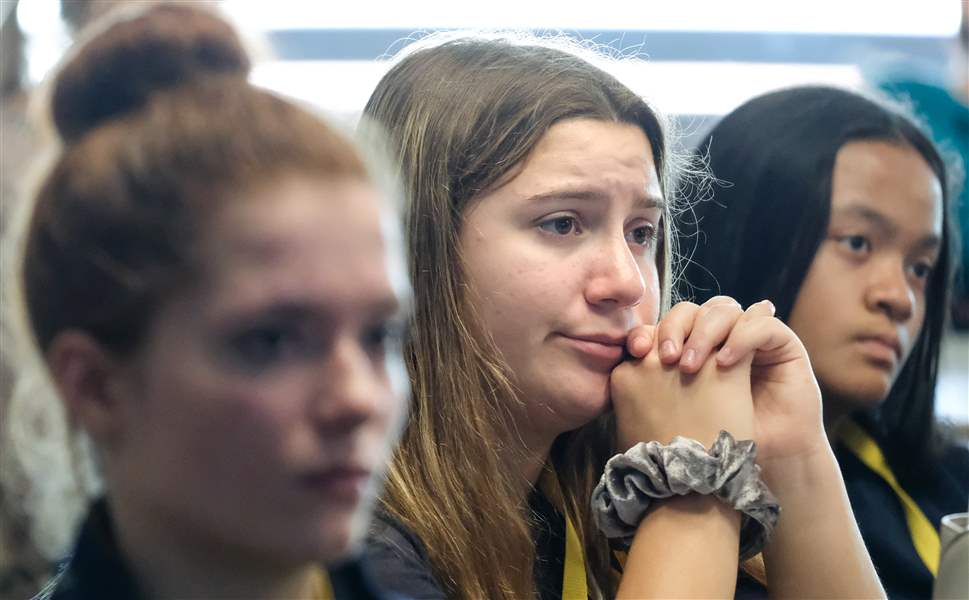
Former Sylvania Township firefighter brings 9/11 lesson to Notre Dame Academy
9/11/2018
Notre Dame Academy student Lauren Susor, 14, listens during a presentation from former Sylvania Township Deputy Fire Chief Tom Eisel Tuesday, September 11, 2018, at Notre Dame Academy in Toledo, Ohio.
THE BLADE/JEREMY WADSWORTH
Buy This Image
We say never forget. We talk about where we were when it happened. We speak to each other, as a nation, with an assumption about a national truism: that the terrorist attacks on Sept. 11, 2001 rip us to our core.
But it’s 17 years later. The country has moved forward. A new generation has been born. Schools are filled with children that can’t forget because they weren’t alive to remember.
And so teachers and parents try to find ways to tell our children not just what happened; not just the facts about death tolls and hijackers and planes and towers; not just loss and heroism and a national debate on how to rebuild, but how it felt.
“This class is one of the first [classes of] students who weren’t alive during Sept. 11,” Natalie Morgan, a history teacher at Notre Dame Academy, said of her freshman students.
On Tuesday, Ms. Morgan gave students a chance to hear a first-person account about how the day and its aftermath felt from someone who had a small part in the story: her father, former Sylvania Township Fire Department Deputy Chief Tom Eisel. He was among many firefighters who went to New York City after the attacks to do what he could to support his brothers and sisters who had lost so much.
PHOTO GALLERY: 9/11 Memorial Stair Climb
Mr. Eisel spoke to students about coming back to the fire station that morning to learn about the attacks, and about how much changed in one day. He spoke about how fire crews started assessing emergency response plans to important structures in the community in case more attacks came — a bomb threat was called in to the township’s municipal building that day. And he spoke about what it meant to watch television while the towers burned.
“We knew firefighters were going into the buildings to rescue people,” he told dozens of students.
He talked about the initial chaos after the terrorist attacks, and how everyone wanted to head to Ground Zero to help, but that no one was prepared for the scale of recovery needed, and that it took weeks to coordinate a response. He and others went to New York in November to stand in for New York firefighters at funerals, as there were so many that attendance put a strain on a department that already was in crisis.
“The sight was unbelievable,” Mr. Eisel said of Ground Zero when he arrived. “The smell was unbelievable.”
Even more unbelievable for those who weren’t alive yet. So students like Niah Lee asked him how it felt that day, and if he was worried there’d be another attack. Yes, he said, so they prepared for the worst.
RELATED: The 2,977 victims of 9/11
Cimran Naik asked how passengers on United Airlines Flight 93 stopped the hijackers from hitting the U.S. Capitol, so Mr. Eisel told her about how passengers learned of the Pentagon and World Trade Center attacks through phone calls and then stormed the cockpit.
Emma Kapszukiewicz said her mother and father have explained 9/11 to her, how they learn a bit in school about the attacks, but that it feels like a touchy subject.
“It’s such a hard subject to talk about,” she said.
The security measures and other changes that occurred after Sept. 11 are simply a fact of life for her and her peers. Heightened airport security just makes sense to her; she wasn’t a part of the national debate about trading liberties for security.
“People our age don’t debate about it, because it’s all we’ve ever known,” she said.
And so the conversation is different than the ones we’ve known. “Where were you?” means something different now for many. They know. They care. But they didn’t live it.
Horizon Science Academy has tried to make the conversation not just a verbal or mental one, but a physical one as well. For the second year, the school network held its 9/11 Memorial Stair Climb, with students and staff walking or running up 110 stories at the University of Toledo Glass Bowl Stadium.
This year, they joined with the Ohio Community Athletic Conference, the University of Toledo, and the Toledo Fire Department, with about 60 people participating in the hour-long event, said Nicholas McClellan, community outreach coordinator for Horizon’s Toledo and Springfield schools.
“We wanted something a little bit different a little bit more impactful,” he said. “Some of our students were not even born when 9/11 happened.”
Mr. McClellan said he got emotional while watching five Toledo firefighters do the steps in full gear, reminding him of those firefighters who ran into the World Trade Center while everyone else ran out.
Seventeen years ago, 412 first responders were among the victims of the terrorist attacks on Sept. 11. So we say never forget, for those who can’t ever remember.